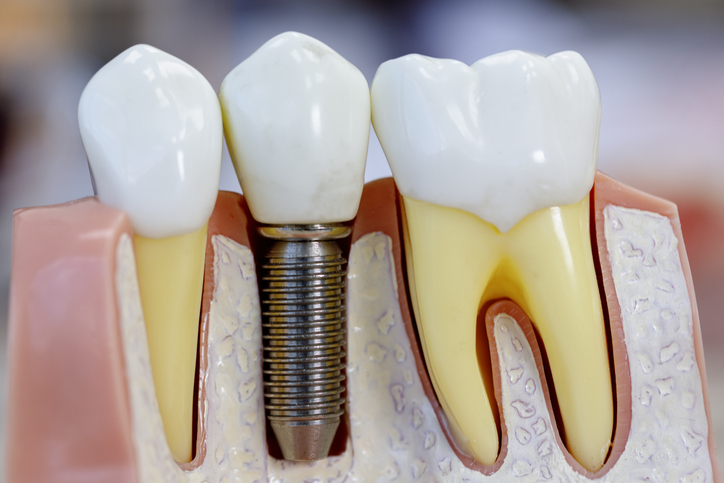
Dental implants do more than replace missing teeth. They can stop bone loss and make your jawbone stronger!
Dental implants are more than just a cosmetic procedure to replace missing teeth. Dental implants can prevent bone loss in your jawbone after you’ve lost a tooth.
Although dentures and bridges also replace lost teeth, they don’t stop bone loss like implants. Dental implants don’t just fill in the space where the teeth once were. They also replace the actual root of the tooth. And with a stable root in your jawbone, your jawbone grows stronger. Here’s how that happens.
How do dental implants stop bone loss?
When you chew or bite down, you press on your jawbone. This repeated action stimulates the bone and keeps it healthy and strong. However, you don’t add as much pressure on your jawbone after you lose a tooth. The bone will subsequently weaken as it is reabsorbed into your body.
Dentures and bridges are great options for replacing teeth, but they don’t stimulate the jawbone as you chew because they sit atop the gums. Consequently, you will likely continue to lose bone mass. On the other hand, dental implants are anchored into your jawbone and act as your natural teeth when you chew or bite, continuing the stimulation your jawbone needs.
So what goes into getting a dental implant?
Before the implant surgery, your dentist will assess if you have enough bone mass to hold the titanium rod. Your dentist can perform a bone graft to build up the jawbone if you don’t. Many different materials and techniques are available today to increase your bone density so your jaw will bond with the implant.
During the implantation, your dentist extracts the tooth and inserts a titanium rod into the root socket. Your jawbone then bonds with the titanium in a process known as osseointegration.
The titanium will take several months to fuse with the jawbone fully. Once that is complete, your dentist will secure a crown to an abutment screwed into the titanium rod. As you chew normally, your jawbone strengthens with its “new” root. The dental implant, in essence, stops bone loss.
Note that if the implants are placed in your upper back teeth, you may need a sinus lift. The nearby sinus cavity may reabsorb your jawbone when you lose a tooth in that area. During this procedure, the sinus is lifted away from the jaw. The bone graft material can fuse with the jawbone. The implant can then be placed after the fusion is complete.
However, a bone graft or sinus lift isn’t needed in most cases. You can expect a standard implant procedure if you have enough bone mass to accept the implant.
Stopping bone loss isn’t the only benefit of dental implants. The implants also restore the shape of your face. When you lose jawbone mass from missing teeth, your lower face may take on a “sunken” look. Your chin moves closer to your nose, and your upper lip may “pucker” inward. Additionally, your gums may shrink and become more prone to periodontal disease if a lost tooth isn’t replaced.
The longer you wait to replace a missing tooth, the more your jawbone will deteriorate. Getting a dental implant soon after you’ve lost a tooth will restore your complete set of teeth and maintain the strength of your jawbone.
Learn more about implants
Schedule an appointment at Espire’s Norman location today! Our highly trained dentists are experts in dental implants and can help you decide if implants are right for you. Don’t live near our Norman, Oklahoma office? Find one of our other locations near you.
Norman, OK
550 24th Avenue S.W.
Norman, OK 73069
